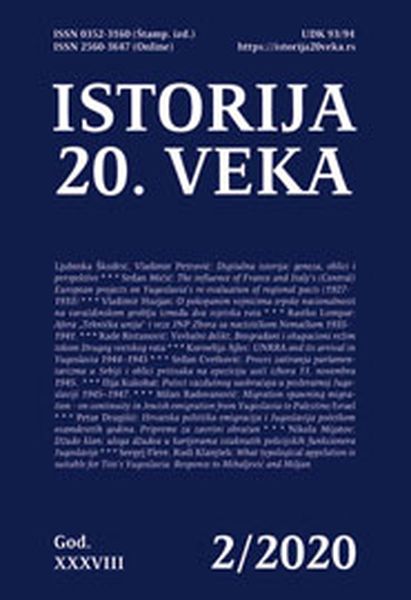AFERA „TEHNIČKA UNIJA“ I VEZE JNP ZBORA SA NACISTIČKOM NEMAČKOM 1935–1941.
THE “TECHNISCHE UNION” AFFAIR AND CONTACTS BETWEEN THE YNM ZBOR AND NAZI GERMANY 1935‒1941
Author(s): Rastko LomparSubject(s): History, Social history, Recent History (1900 till today)
Published by: Institut za savremenu istoriju, Beograd
Keywords: YNM Zbor; Dimitrije Ljotić; National Socialist Germany; German Intelligence Service; Technische Union;
Summary/Abstract: Since its creation in 1935, the Yugoslav National Movement Zbor had a special connection with Nazi Germany. Dimitrije Ljotić quickly overcame his initial skepticism toward National Socialism and the movement adopted an unmistakably pro-Nazi stance. This shift did not go unnoticed by the German side, and after April 1936 the YNM Zbor maintained contacts with various German official and unofficial representatives. As a result, in late 1936 an ambitious plan was hatched, which foresaw the establishment of the so called “Technische Union” society. The TU was supposed to be a joint Yugoslav-German venture which would increase economic cooperation between the two countries and simultaneously strengthen Zbor’s position in Yugoslavia. However, Yugoslav Prime Minister Milan Stojadinović did not look favorably upon the possible strengthening of Zbor. Therefore, starting in early 1937, his allies started attacking Zbor openly, both in the parliament and in the press, claiming that the movement was illegally financed from Germany and therefore was in fact a German “fifth column” in Yugoslavia. These accusations were quickly picked up by the foreign press and the scandal started damaging Germany’s foreign political position. Therefore, both the Germans and Dimitrije Ljotić’s followers started distancing themselves from the TU, which soon collapsed. This scandal left a lasting mark on the ties between Zbor and the German officials. When Germany plunged the world into war in 1939, Ljotić started adopting a more critical attitude toward National Socialism which also strained their relations. However, the contacts were never broken off entirely and the Germans continued monitoring the fate of the movement closely, especially during the events that led to the outlawing of Zbor in November of 1940.
Journal: Istorija 20. veka
- Issue Year: 2020
- Issue No: 2
- Page Range: 85-102
- Page Count: 18
- Language: Serbian

